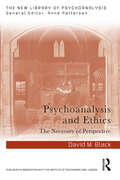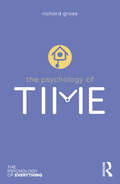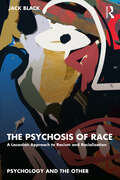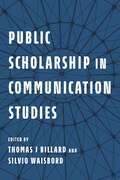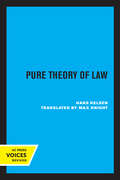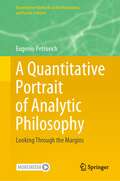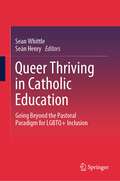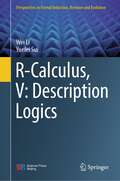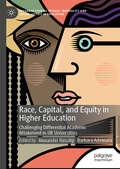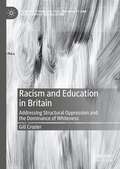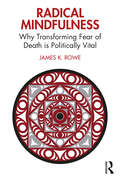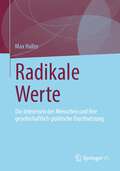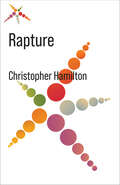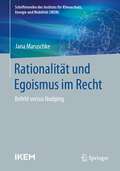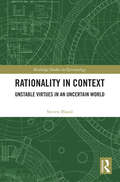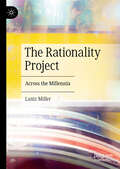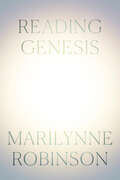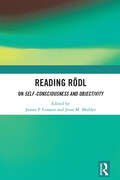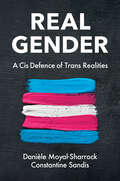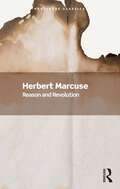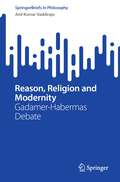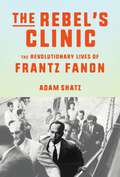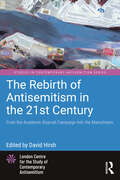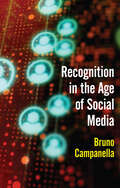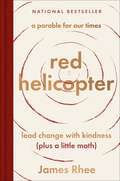- Table View
- List View
Psychoanalysis and Ethics: The Necessity of Perspective (New Library of Psychoanalysis)
by David M. BlackPsychoanalysis and Ethics: The Necessity of Perspective is an attempt to look deeply into the relationship between psychoanalysis and ethics, and in particular into the failure of traditional psychoanalytic thinking to recognise the foundational character of ethical values. In recent years, partly because of the climate crisis, the need for an "ethical turn" in our thinking has been recognised with increasing urgency. Using different historical lenses, and with special reference to the thought of the philosopher Emmanuel Levinas and pioneering American psychoanalysts such as Hans Loewald and Stephen Mitchell, the author discusses the perspectives needed in addition to those of science if the facts of "psychic reality" are to be more adequately recognised. In particular, this book emphasises the importance of a coherent account of the role of ethics in shaping the development both of the individual and of society. Psychoanalysis and Ethics is essential reading for those concerned for the importance of ethics in psychoanalytic practice and theory, and more widely for those seeking to understand the place of ethics and religion in psychological development.
The Psychology of Time (The Psychology of Everything)
by Richard GrossWhat is the meaning of time? Do we have an internal clock? Can time speed up or slow down?The Psychology of Time considers how we define, describe, and experience time. From a discussion of how our language around time is dependent on metaphor, to the role of biology in controlling our bodily experience of time, the book delves into how the finitude of life is a given human experience. It looks at how we reflect on the passage of time throughout our lives, and how our experience of time can be influenced by diverse factors including our age, gender, health, and culture.Offering insights into something we are all immersed in, but often give little thought to, The Psychology of Time shows us how our understanding and experience of time can influence our everyday behaviour.
The Psychosis of Race: A Lacanian Approach to Racism and Racialization (Psychology and the Other)
by Jack BlackThe Psychosis of Race offers a unique and detailed account of the psychoanalytic significance of race, and the ongoing impact of racism in contemporary society. Moving beyond the well-trodden assertion that race is a social construction, and working against demands that simply call for more representational equality, The Psychosis of Race explores how the delusions, anxieties, and paranoia that frame our race relations can afford new insights into how we see, think, and understand race’s pervasive appeal. With examples drawn from politics and popular culture—such as Candyman, Get Out, and the music of Kendrick Lamar—critical attention is given to introducing, as well as explicating on, several key concepts from Lacanian psychoanalysis and the study of psychosis, including foreclosure, the phallus, Name-of-the-Father, sinthome, and the objet petit a. By elaborating a cultural mode to psychosis and its understanding, an original and critical exposition of the effects of racialization, as well as our ability to discern the very limits of our capacity to think through, or even beyond, the idea of race, is provided. The Psychosis of Race speaks to an emerging area in the study of psychoanalysis and race, and will appeal to scholars and academics across the fields of psychology, sociology, cultural studies, media studies, and the arts and humanities.
Public Scholarship in Communication Studies
by Thomas J. Billard Silvio Waisbord Amy Jordan Rachel Kuo Philip M Napoli Chad Raphael Paula Gardner Holley Wilkin Srividya Ramasubramanian Sue Robinson Yidong Wang Elaine Almeida Aymar Jean Christian Stacey L Connaughton Susan Mancino Daniel Kreiss Shannon C McGregor Danielle K Brown Todd P Newman Becca Beets Larry GrossPrometheus brought the gift of enlightenment to humanity and suffered for his benevolence. This collection takes on scholars’ Promethean view of themselves as selfless bringers of light and instead offers a new vision of public scholarship as service to society. Thomas J Billard and Silvio Waisbord curate essays from a wide range of specialties within the study of communication. Aimed at scholars and students alike, the contributors use approaches from critical meditations to case studies to how-to guides as they explore the possibilities of seeing shared knowledge not as a gift to be granted but as an imperative urging readers to address the problems of the world. Throughout the volume, the works show that a pivot to ideas of scholarship as public service is already underway in corners of communication studies across the country. Visionary and provocative, Public Scholarship in Communication Studies proposes a needed reconsideration of knowledge and a roadmap to its integration with community. Contributors: Elaine Almeida, Becca Beets, Thomas J Billard, Danielle K. Brown, Aymar Jean Christian, Stacey L. Connaughton, Paula Gardner, Larry Gross, Amy Jordan, Daniel Kreiss, Rachel Kuo, Susan Mancino, Shannon C. McGregor, Philip M. Napoli, Todd P. Newman, Srividya Ramasubramanian, Chad Raphael, Sue Robinson, Silvio Waisbord, Yidong Wang, and Holley Wilkin
Pure Theory of Law
by Hans KelsenThis title is part of UC Press's Voices Revived program, which commemorates University of California Press’s mission to seek out and cultivate the brightest minds and give them voice, reach, and impact. Drawing on a backlist dating to 1893, Voices Revived makes high-quality, peer-reviewed scholarship accessible once again using print-on-demand technology. This title was originally published in 1967.
A Quantitative Portrait of Analytic Philosophy: Looking Through the Margins (Quantitative Methods in the Humanities and Social Sciences)
by Eugenio PetrovichThis book offers an unprecedented quantitative portrait of analytic philosophy focusing on two seemingly marginal features of philosophical texts: citations and acknowledgements in academic publications. Originating from a little network of philosophers based in Oxford, Cambridge, and Vienna, analytic philosophy has become during the Twentieth century a thriving philosophical community with thousands of members worldwide. Leveraging the most advanced techniques from bibliometrics, citations and acknowledgments are used in this book to shed light on both the epistemology and the sociology of this philosophical field, illuminating the intellectual trajectory of analytic philosophy as well as the social characteristics of the analytic community. Special attention is dedicated to the last forty years, providing insights into a phase of analytic philosophy which is still understudied by historians of philosophy. In the eight chapters of the book, readers will find not only numerous quantitative investigations and technical explanations, but also a robust theoretical framework and epistemological reflections on the strengths and limitations of quantitative methods for the study of philosophy. With its strong interdisciplinary appeal, this book will engage a wide range of scholars, including historians of philosophy seeking new methodologies, analytic philosophers interested in a new look at their discipline, and scholars in digital humanities, bibliometrics, and quantitative studies of science, who will find many innovative techniques for investigating disciplinary fields.
Queer Thriving in Catholic Education: Going Beyond the Pastoral Paradigm for LGBTQ+ Inclusion
by Sean Whittle Seán HenryThis book provides readers with the opportunity to go beyond anecdote and supposition in order to get a fuller grasp of research around Catholic education and LGBTQ+ matters. This is an edited collection of chapters which explores LGBTQ+ matters in relation to Catholic education. Although the field of Catholic Education Studies has grown exponentially over the past two decades, little if any attention has been published specifically about the place of LGBTQ+ students (and teachers) in the context of Catholic education. This edited book presents the various strands of research about Catholic education and LGBTQ+ inclusion. More specifically, this edited book of chapters addresses a number of broader themes including:• Is it possible for Catholic education to sit in harmony with the concerns of LGBTQ+ inclusive education?• What does it mean to ‘queer’ education at all? How does this sit in relation to Catholic perspectives on the purpose of Catholic education?• When it comes to LGBTQ+ issues in relation to Catholic education, what is the research agenda?• How might Catholic schools move beyond a ‘pastoral accommodation’ approach to LGBTQ+ students?• What does the evidence from research in Catholic schools indicate? Are they places of inclusion, hospitality, and welcome for LGBTQ+ young people?
R-Calculus, V: Description Logics (Perspectives in Formal Induction, Revision and Evolution)
by Wei Li Yuefei SuiThis book series consists of two parts, decidable description logics and undecidable description logics. It gives the R-calculi for description logics. This book offers a rich blend of theory and practice. It is suitable for students, researchers and practitioners in the field of logic.
Race, Capital, and Equity in Higher Education: Challenging Differential Academic Attainment in UK Universities (Palgrave Studies in Race, Inequality and Social Justice in Education)
by Alexander Hensby Barbara AdewumiThis book examines the structural and cultural factors that explain the persistence of an attainment gap between white and Black, Asian, and Minority Ethnic (BAME) students in UK universities. So-called ‘deficit’ approaches have long represented the orthodoxy in higher education strategy-making, yet they overlook the structural and institutional factors that reproduce attainment gaps. Whereas students already in possession of the right ‘academic capital’ are made to feel validated and empowered in their learning, BAME students – particularly those from working class backgrounds – may feel marginalised by dominant hierarchical cultures on campus.This book provides an important and unique contribution to the study of racial equity in higher education. Its chapters provide a breadth and depth of analyses which help explain the roots of the attainment gap, while offering reflections and commentaries on the necessary steps that universities must take in order to ensure equityfor students from all backgrounds.
Racism and Education in Britain: Addressing Structural Oppression and the Dominance of Whiteness (Palgrave Studies in Race, Inequality and Social Justice in Education)
by Gill CrozierThis book is concerned with racism and education in Britain. It aims to seek greater understanding of the nature and endurance of racism within education practice in the 21st century and to examine the relationship between racism and the educational experiences and outcomes of many Black, Asian and Minority Ethnic (BAME) children and young people, with reference to school and university. Employing Critical Race Theory, Critical Whiteness Theory and Intersectionality, this structural analysis traces the historical and contemporary development of racism in education. White privilege and White supremacy, it is argued, are central to the perpetuation of racism and the failure to either understand or recognise the systemic nature of racial oppression. The book focuses on Britain, but the analysis locates racism as a global phenomenon. In spite of decades of policies on ‘race’ equality in Britain, BAME children and young people continue to be discriminated against and are failed by the education system. Applying a theoretical analysis of racism and White supremacy and privilege to an examination of government policies and research in schools and universities, the nature and extent of racism is revealed in the educational experiences of young people.
Radical Mindfulness: Why Transforming Fear of Death is Politically Vital
by James K. RoweRadical Mindfulness examines the root causes of injustice, asking why inequalities along the lines of race, class, gender, and species continue to exist. Specifically, James K. Rowe examines fear of death as a root cause of systemic inequalities and proposes a more embodied approach to social change as a solution. Collecting insights from powerful thinkers across multiple traditions—including Black radicals, Indigenous resurgence theorists, terror management theorists, and Buddhist feminists— Rowe argues for the political importance of seemingly apolitical practices such as meditation and ritual. On their own, these strategies are not enough, but integrated into social movements that are combating structural injustices, mind–body practices can begin transforming the embodied fears that feed endless fuel to supremacist ideologies and yet are not targeted by most political actors. Radical Mindfulness is for academics, activists, and individuals who want to overcome supremacy of all kinds but are struggling to understand and develop methods for attacking it at the roots.
Radikale Werte: Die Interessen der Menschen und ihre gesellschaftlich-politische Durchsetzung
by Max HallerEin berühmter, immer wieder zitierter Satz von Max lautet: „Interessen (materielle und ideelle), nicht: Ideen, beherrschen unmittelbar das Handeln der Menschen. Aber: die ‚Weltbilder‘, welche durch ‚Ideen‘ geschaffen wurden, haben sehr oft als Weichensteller die Bahnen bestimmt, in denen die Dynamik der Interessen das Handeln fortbewegte.“ Die neuere Soziologie ist diesem Grundsatz allerdings nicht gerecht geworden. Werte und ihre Wirkung werden entweder als gegeben vorausgesetzt (so bei Talcott Parsons) oder überhaupt als irrelevant betrachtet (so in der Rational Choice- und Systemtheorie). Die umfangreiche, empirische Werteforschung hat vielfältige Ergebnisse erbracht, blieb jedoch weitgehend ohne theoretisches Fundament, sodass ihre Befunde vielfach anfechtbar sind. Weber selbst gab im Hinblick auf die Frage nach der Relevanz der Werte nur unbefriedigende Antworten: Die Entscheidung für bestimmte Werte sei eine rein individuelle Angelegenheit und zwischen den verschiedenenWerten gebe es einen unversöhnlichen Kampf. Im vorliegenden Buch wird diese Problematik erstmals in der deutschen Soziologie umfassend untersucht und es wird dafür (u.a. im Anschluss an Autoren wie Immanuel Kant, George H. Mead und Raymond Boudon), eine neue, konstruktive und erklärungsstarke Lösung gefunden. Unter Zuhilfenahme von Überlegungen aus Philosophie, Sozialtheorie und empirischer Sozialforschung sowie unter Einbeziehung historischer Kämpfe zur Anerkennung und Durchsetzung der Werte kann man feststellen, dass es gesellschaftliche Grundwerte gibt, dass deren Anzahl klar bestimmbar ist und dass zwischen ihnen keineswegs Konflikt, sondern Komplementarität besteht. Mit diesen Thesen und Befunden kann dieses Buch als neues soziologisches Standardwerk angesehen werden. Es hat auch für Vertreter vieler anderer geistes- und sozialwissenschaftlicher Disziplinen grundlegende Bedeutung.
Rapture (No Limits)
by Christopher HamiltonWhat is it like to experience rapture? For philosopher Christopher Hamilton, it is a loss of self that is also a return to self—an overflowing and emptying out of the self that also nourishes and fills the self. In this inviting book, he reflects on the nature of rapture and its crucial yet unacknowledged place in our lives.Hamilton explores moments of rapture in everyday existence and aesthetic experience, tracing its disruptive power and illuminating its philosophical significance. Rapture is found in sexual love and other forms of intense physical experience, such as Philippe Petit’s nerve-defying wire walk between the Twin Towers. Hamilton also locates it in quieter but equally joyous moments, such as contemplating a work of art or the natural world. He considers a range of examples in philosophy and culture—Nietzsche and Weil, Woolf and Chekhov, the extremes of experience in Werner Herzog’s films—as well as aspects of ordinary life, from illness to gardening. Conversational and evocative, this book calls on us to ask how we might make ourselves more open to experiences of rapturous joy and freedom.
Rationalität und Egoismus im Recht: Befehl versus Nudging (Schriftenreihe des Instituts für Klimaschutz, Energie und Mobilität)
by Jana MaruschkeDieses Buch fragt danach, wie Recht und Rechtsprechung, Staats- und Rechtstheorie sowie moderne Verhaltensökonomie die Rationalität und den Egoismus des Menschen begreifen und wie dies die Wahl staatlicher Steuerungsinstrumente beeinflusst. Das scheinbar neuartige Instrument Nudging wird mit Blick auf Umweltschutzinstrumente, die Regulierung des Tabakrauchens und der Organspende in den öffentlich-rechtlichen Handlungsformenkatalog eingeordnet, wobei verfassungsrechtliche Grenzen diskutiert werden. Zielgruppe sind die an der "Metaebene" des Rechts und der Verhaltenssteuerung interessierten Leserinnen und Leser.
Rationality in Context: Unstable Virtues in an Uncertain World (Routledge Studies in Epistemology)
by Steven BlandThis book uses the psychological literature on rationality to weigh in on the recent debate between virtue epistemologists and epistemic situationists. It argues that both sides have misconstrued the literature and that an interactionist framework is needed to square epistemic theory with empirical facts about reasoning and inference. The explosion of empirical literature on human rationality has led to seismic shifts across a multitude of academic disciplines. This book considers its implications for epistemology. In particular, it critically evaluates the treatment of the rationality literature within the recent controversy between virtue epistemologists, who attempt to ground knowledge in stable epistemic virtues, and epistemic situationists, who claim that such a project is doomed by empirical evidence of widespread irrationality. It links this foundational controversy to two of the most important debates in psychology: the Rationality Wars and the person-situation debate. The book argues that both virtue theorists and epistemic situationists have misunderstood the implications of these debates, leading them to focus exclusively on personal dispositions and situational factors as two independent sources of epistemic success, failure, and improvement. A more accurate reading of the empirical literature implies that interactions between epistemic agents and their social, informational, and institutional environments are the fundamental drivers of both rational and irrational behaviour. An interactionist framework motivated by this insight conceives of epistemic virtues and vices as both responsive to and responsible for the environments in which they’re manifested and cultivated. The central aim of this book is to present and defend this novel type of virtue epistemology. Rationality in Context will be of interest to scholars and advanced students working in epistemology, philosophy of science, philosophy of psychology, cognitive psychology, and social psychology.
The Rationality Project: Across the Millennia
by Lantz MillerRationality has been philosophers’ concern stretching back to ancient times. But just what is rationality? In trying to answer this question, rationality is found to be more complex than supposed. This book investigates this supposition and thereby aspires to bring together the facets of the peculiar phenomenon that is rationality. Rationality is shown to be both more complex than presumed and yet more accessible than many may have feared. One argument concedes the common assumption that those interested in rationality need only rely on intuitions about this phenomenon. Yet, even moderate research reveals the concept’s profound fuzziness. This book aims to set forth a theory, explanation, and unification of the kindred and disparate understandings of this elusive concept, rationality.
Reading Genesis
by Marilynne RobinsonOne of our greatest novelists and thinkers presents a radiant, thrilling interpretation of the book of Genesis.For generations, the book of Genesis has been treated by scholars as a collection of documents, by various hands, expressing different factional interests, with borrowings from other ancient literatures that mark the text as derivative. In other words, academic interpretation of Genesis has centered on the question of its basic coherency, just as fundamentalist interpretation has centered on the question of the appropriateness of reading it as literally true.Both of these approaches preclude an appreciation of its greatness as literature, its rich articulation and exploration of themes that resonate through the whole of Scripture. Marilynne Robinson&’s Reading Genesis is a powerful consideration of the profound meanings and promise of God&’s enduring covenant with man. This magisterial book radiates gratitude for the constancy and benevolence of God&’s abiding faith in Creation.
Reading Rödl: On Self-Consciousness and Objectivity
by James F. Conant Jesse M. MulderSebastian Rödl's Self-Consciousness and Objectivity is one of the most original and thought-provoking books in analytic philosophy for the last several years. An ambitious defence of absolute idealism, Rödl rejects the idea that we as thinking beings can position ourselves within a given, mind-independent reality, and instead advances the position that the very idea of an ‘objective reality’ coincides with the self-consciousness of thought. In this outstanding collection, a roster of international contributors critically examine the significance of Rödl's arguments and develop them in new directions. Their contributions are organised into the following six sections: Self-Consciousness and Objectivity and naturalism Self-Consciousness and Objectivity and formal idealism Self-Consciousness and Objectivity and quietism Self-Consciousness and Objectivity and absolute idealism Self-Consciousness and Objectivity and the power of judgment Self-Consciousness and Objectivity and the determinacy of the individual. The volume concludes with an extensive response by Sebastian Rödl to his critics. This book constitutes essential reading for anyone interested in contemporary debates at ther intersection of analytic philosophy and philosophical idealism.
Real Gender: A Cis Defence of Trans Realities
by Constantine Sandis Danièle Moyal-SharrockSocieties around the world are struggling to think clearly about trans realities and understand trans identities. Real Gender is the first book to present a cis defence of what it means to be transgender. Moyal-Sharrock and Sandis delve into the various factors which make many trans people’s experience of their gender (or lack thereof) as natural and unquestionable as that of cis people. While recognising the undeniably social aspects of gender, they find that gender cannot be completely divorced from our biological underpinnings. Contrary to popular opinion, gender self-identification does not require the denial of either biology or sex. What is needed is a more liberal understanding of our gender concepts, which would prevent us from confusing diversity with pathology. Steeped in published and personal trans testimonials, Real Gender does not seek to provoke or attack, but to unequivocally defend trans realities. A powerful exploration of a divisive topic, this book will be of interest to a wide audience of readers.
Reason and Revolution (Routledge Classics)
by Herbert MarcuseFew philosophers have had a more lasting impact on the philosophy of history than Friedrich Hegel. Reason and Revolution is Herbert Marcuse's brilliant interpretation of Hegel's philosophy and the influence it has had on political thought, from the French Revolution to the twentieth century. In a masterpiece of dialectical thought, Marcuse superbly illuminates the implications of Hegel's philosophy, rescuing it from the taint of reactionary thought that distorted or dismissed it for the early part of the twentieth century. After a masterful survey of the main elements of Hegel's philosophical system, Marcuse argues that it is Hegel the rationalist and progressive who stands in contrast to the irrationalism of Nazism, providing the crucial platform on which Marxist thought would later build and take Hegel's thought in a radical and explosive new direction. A vital book in the development of critical theory and for understanding the great battle between liberal and reactionary thought, Reason and Revolution remains essential reading today. This Routledge Classics edition includes a new Foreword by J.M. Bernstein.
Reason, Religion and Modernity: Gadamer-Habermas Debate (SpringerBriefs in Philosophy)
by Anil Kumar VaddirajuThis book deals with the question of understanding religion and its relationship with politics in the context of developing countries. It reviews specific theories, such as modernisation theory, marxism, liberalism, hermeneutics and critical approach to explain questions related to religion and religious traditions. The book focuses on the recent attempts to theorise religion by Jurgen Habermas. It argues modernisation and orthodox Marxian theory are inadequate in understanding the recent spurt of religious phenomenon in politics. It discusses Hans-Georg Gadamer’s view to show a way forward regarding dialectical hermeneutics in facilitating a dialogue between different traditions and religions. The book is of interest to students, scholars, practitioners of development, and all those who concern themselves with the questions of religion, tradition, modernity and secular well-being in developing countries such as India and beyond.
The Rebel's Clinic: The Revolutionary Lives of Frantz Fanon
by Adam ShatzOne of The New Yorker's best books of 2024Named a most anticipated book of 2024 by Foreign Policy | Lit Hub | The Millions"Nimble and engrossing. . . [An] exemplary work of public intellectualism." —Becca Rothfeld, The Washington PostA revelatory biography of the writer-activist who inspired today’s movements for social and racial justiceIn the era of Black Lives Matter, Frantz Fanon’s shadow looms larger than ever. He was the intellectual activist of the postcolonial era, and his writings about race, revolution, and the psychology of power continue to shape radical movements across the world. In this searching biography, Adam Shatz tells the story of Fanon’s stunning journey, which has all the twists of a Cold War-era thriller. Fanon left his modest home in Martinique to fight in the French Army during World War II; when the war was over, he fell under the influence of Existentialism while studying medicine in Lyon and trying to make sense of his experiences as a Black man in a white city. Fanon went on to practice a novel psychiatry of “dis-alienation” in rural France and Algeria, and then join the Algerian independence struggle, where he became a spokesman, diplomat, and clandestine strategist. He died in 1961, while under the care of the CIA in a Maryland hospital. Today, Fanon’s Black Skin, White Masks and The Wretched of the Earth have become canonical texts of the Black and global radical imagination, comparable to James Baldwin’s essays in their influence. And yet they are little understood. In The Rebel’s Clinic, Shatz offers a dramatic reconstruction of Fanon’s extraordinary life—and a guide to the books that underlie today’s most vital efforts to challenge white supremacy and racial capitalism.Includes 8 pages of black-and-white photographs
The Rebirth of Antisemitism in the 21st Century: From the Academic Boycott Campaign into the Mainstream (Studies in Contemporary Antisemitism)
by David HirshThe Rebirth of Antisemitism in the 21st Century is about the rise of antizionism and antisemitism in the first two decades of the 21st century, with a focus on the UK. It is written by the activist-intellectuals, both Jewish and not, who led the opposition to the campaign for an academic boycott of Israel. Their experiences convinced them that the boycott movement, and the antizionism upon which it was based, was fuelled by, and in turn fuelled, antisemitism. The book shows how the level of hostility towards Israel exceeded the hostility which is levelled against other states. And it shows how the quality of that hostility tended to resonate with antisemitic tropes, images and emotions. Antizionism positioned Israel as symbolic of everything that good people oppose, it made Palestinians into an abstract symbol of the oppressed, and it positioned most Jews as saboteurs of social ‘progress’. The book shows how antisemitism broke into mainstream politics and how it contaminated the Labour Party as it made a bid for Downing Street. This book will be of interest to scholars and students researching antizionism, antisemitism and the Labour Party in the UK.
Recognition in the Age of Social Media: Race, Gender, And Violence
by Bruno CampanellaThe desire to be recognized is a basic human trait. In contemporary society, social media platforms play a key role in defining how processes of recognition take shape. To post, to like, or to comment have become daily practices of expressing individual recognition. On the one hand, social media platforms make it easier for individuals to be visible and to be recognized; on the other hand, they control the structure of these dynamics. This timely and original book reflects on processes of recognition on social media platforms. Revisiting traditional discussions on recognition theory, Bruno Campanella investigates how the field of media and communication has used the concept and poses new questions raised by the omnipresence of social media. He argues that existing work does not fully explore the impact of platforms on contemporary processes of recognition. Individuals must learn new skills to make themselves visible online, but how to achieve this changes as a consequence of the role played by platforms: what is seen depends on decisions taken by their algorithms, which impacts how individuals and social groups are valued in society. Recognition in the Age of Social Media is a key contribution to the field, and a must-read for students and scholars of media and communication, sociology, and politics.
red helicopter—a parable for our times: lead change with kindness (plus a little math)
by James RheeA NATIONAL BESTSELLEREmbrace your agency, lead change, and fly free—in the business of life and the life of business—with kindness (plus a little math)In kindergarten, James Rhee received a toy red helicopter in gratitude for a simple act of generosity—sharing his lunch. Decades later, the lesson from that small gift led him to develop a human-centered framework for business and personal achievement that helped him overcome seemingly insurmountable hurdles and find unprecedented success.“red helicopter is a transformative experience. James Rhee's story is a must read for anyone, of any age, who wishes to think, act, and lead with balance, agility, and wisdom." —Jay ShettyRhee was a high school teacher turned private equity investor when he unexpectedly took the helm of Ashley Stewart, an iconic company predominantly employing and serving Black women. Inspired by the values his dying Korean immigrant parents instilled in him, he knew that a radically different—yet familiar—approach was required to lead this twice-bankrupt company from certain liquidation to true transcendence.Is it possible to be successful and kind? To lead with precision and compassion? To honor who we are in all areas of our lives?The entire world bet against him and Ashley, but Rhee trusted his instincts to identify, measure, and leverage the intangible goodwill at the company’s core, a decision which ultimately multiplied its fortunes several times over.Anyone can combine the clarity and imagination we had as children with fundamental business metrics. Anyone can apply this refreshingly intuitive approach to lead change at work and at home. While eloquently sharing a story of personal and professional success, red helicopter presents a comforting yet bold solution to the dissatisfaction and worry we all feel in a chaotic and sometimes terrifying world.The insights and knowledge that Rhee imparts have been accumulated over decades of investing and leading at the highest levels of business. Drawing on this experience, he encourages us to trust the wisdom deep inside each of us so we can learn how to:Create and measure “goodwill,” the ultimate collective goodDiscover agency and the truth about kindness it entailsIdentify the invisible obstacles standing in your wayLead transformational change through small, scalable actsConstruct an accurate “balance sheet” of our assets and liabilitiesReorient our lives, organizations, and the world to reflect the best in usAre you looking for a sustainable balance between life, money, and joy? For yourself and others?Imagine, a clear path forward told as a deeply felt human story. A poignant and uplifting celebration of humanity, red helicopter—a parable for our times is a tale of struggle and triumph, compelling for its honesty and relatability as much as for the instructions we can all use to balance the books of our lives.red helicopter—a parable for our times features approximately 20 original illustrations by Korean artist Heyon Cho.
